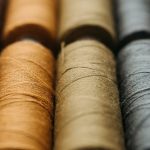Looking for the best medical thread options for surgical use? With over 234 million surgical procedures performed globally each year, choosing the right medical thread is crucial for successful outcomes.
Absorbable options like polyglactin and polydioxanone are popular for internal suturing, while non-absorbable choices such as silk and nylon are preferred for long-term support. Silk surgical threads offer excellent handling and knot security, making them ideal for delicate procedures.
Nylon surgical threads are known for their strength and flexibility, making them suitable for a wide range of surgeries. Polypropylene surgical threads, on the other hand, are valued for their minimal tissue reactivity and high tensile strength.
When it comes to surgical threads, understanding the options can make a significant difference in patient care.
Key Takeaways
- Absorbable medical threads like polyglactin and polydioxanone are popular choices for internal suturing as they naturally degrade over time, eliminating the need for removal.
- Non-absorbable medical threads made of materials like polypropylene, polyester, nylon, and stainless steel offer high tensile strength and minimal tissue reactivity, providing long-term support and stability in surgical procedures.
- Silk surgical threads have exceptional tensile strength, are flexible, and tie easily, making them suitable for intricate surgical procedures. They also have a softer texture and are less likely to cause an immune response.
- Nylon surgical threads offer high tensile strength, excellent knot security, and superior handling characteristics compared to silk or polyester threads. They are also durable, resistant to degradation, and have low tissue reactivity, reducing the risk of inflammation or infection.
- Polypropylene surgical threads have exceptional thread strength, minimize tissue reaction, and are resistant to mildew, bacteria, and insects. They are suitable for delicate or sensitive tissues and promote optimal wound healing and successful surgical outcomes.
Absorbable Medical Threads
Choose absorbable medical threads for surgical procedures that require the material to naturally degrade over time. These threads are designed to be broken down by the body, eliminating the need for removal after the healing process.
One crucial factor to consider when selecting absorbable medical threads is their tensile strength. This refers to the thread's ability to withstand tension without breaking. Threads with high tensile strength are essential for providing support and maintaining wound closure during the healing process.
Additionally, biocompatibility is a key feature of absorbable medical threads. This ensures that the threads don't cause any adverse reactions within the body and can be safely absorbed without causing inflammation or rejection.
When choosing absorbable medical threads for surgical procedures, it's important to consider these factors to ensure optimal healing and minimize the risk of complications. High tensile strength and biocompatibility are critical characteristics that contribute to the effectiveness and safety of absorbable medical threads in surgical settings.
Non-Absorbable Medical Threads
Non-absorbable medical threads provide long-term support and stability in surgical procedures requiring permanent material retention. When considering non-absorbable medical threads for surgical use, it's essential to take into account the suture material properties and the advancements in suture techniques.
- Suture Material Properties: Non-absorbable medical threads are commonly made from materials such as polypropylene, polyester, nylon, or stainless steel. These materials offer high tensile strength, minimal tissue reactivity, and resistance to degradation, making them suitable for long-term implantation. Understanding the properties of each material is crucial in selecting the most appropriate thread for specific surgical applications.
- Suture Technique Advancements: The advancements in suture techniques have led to the development of various non-absorbable thread designs, including monofilament and braided threads. Additionally, the introduction of innovative coating technologies has improved the handling characteristics and knot security of non-absorbable threads, enhancing their performance in surgical procedures.
Silk Surgical Threads
When selecting surgical threads, consider silk as a durable and versatile option for various medical procedures. Silk surgical threads offer several advantages over other materials.
They're known for their exceptional tensile strength, which allows them to withstand the tension placed on them during wound closure. This makes silk threads particularly suitable for use in areas where a strong suture is required.
Additionally, silk threads are flexible and tie easily, making them ideal for intricate surgical procedures. Compared to synthetic materials like nylon or polyester, silk threads have a softer texture, reducing the risk of tissue irritation and inflammation.
Silk threads are also less likely to cause an immune response compared to some other materials, making them a favorable choice for patients with sensitivities.
When considering the best medical thread options for surgical use, the unique properties of silk make it a preferred choice for many surgeons.
Nylon Surgical Threads
Consider using nylon surgical threads for their high tensile strength and excellent knot security, making them a reliable option for various surgical procedures. Nylon thread benefits include its durability and resistance to degradation in the body, making it suitable for long-term wound support.
Additionally, nylon threads are less likely to cause tissue reactivity, reducing the risk of inflammation or infection post-surgery. When compared to silk or polyester surgical thread alternatives, nylon threads offer superior handling characteristics, allowing for easier manipulation during intricate surgical procedures.
Moreover, nylon threads maintain their tensile strength over time, providing long-lasting support for wound closure. With their low moisture absorption properties, nylon surgical threads are less prone to weakening when exposed to bodily fluids, ensuring consistent performance in diverse surgical environments.
Polypropylene Surgical Threads
You may also opt for polypropylene surgical threads for their distinct advantages in surgical use, particularly in comparison to nylon threads.
Polypropylene threads offer exceptional thread strength, making them ideal for use in surgeries that require long-term tensile support. The material's high tensile strength allows for secure tissue approximation, reducing the risk of wound dehiscence.
Additionally, polypropylene threads are known for their minimal tissue reaction. This is particularly beneficial as it reduces the likelihood of inflammation and adverse reactions within the body. The threads are inert and don't provoke significant immune responses, making them suitable for use in various surgical procedures, especially those involving delicate or sensitive tissues.
Furthermore, polypropylene threads are resistant to mildew, bacteria, and insects, which contributes to their overall reliability in surgical settings.
When considering surgical threads, the exceptional thread strength and minimal tissue reaction make polypropylene threads a favorable choice for ensuring successful surgical outcomes and promoting optimal wound healing.
Frequently Asked Questions
Are There Any Potential Risks or Complications Associated With Using Medical Threads in Surgery?
When using medical threads in surgery, potential risks include infection and tissue damage. Proper sterilization is crucial to minimize these risks. Long-term durability and patient satisfaction depend on the type of thread used and surgical technique employed.
How Do Medical Threads Compare in Terms of Cost and Availability?
When comparing medical threads for surgical use, it's essential to conduct a thorough cost comparison and availability analysis. This ensures that you select the most suitable option that meets both your budget and the demands of your practice.
Can Medical Threads Be Used in All Types of Surgical Procedures or Are There Limitations to Their Use?
In various surgical procedures, medical threads offer benefits such as tissue support and wound closure. However, limitations exist, such as the potential for tissue reaction and the need for specific thread types in different surgeries.
Are There Any Specific Guidelines or Best Practices for Selecting the Right Type of Medical Thread for a Particular Surgical Procedure?
When selecting medical threads for surgical procedures, guidelines and best practices are crucial. Consider advancements in medical thread technology, limitations, and potential risks. The selection process should be meticulous to ensure optimal outcomes.
Are There Any New Advancements or Developments in Medical Thread Technology That Could Impact Their Use in Surgical Settings?
New advancements in medical thread technology have significant impact on surgery. Technological developments like biodegradable threads and advanced suturing techniques enhance outcomes in surgical settings. Understanding these innovations is crucial for mastering modern surgical practices.
- What Is the Difference Between Spunbond and Meltblown Nonwoven? - July 11, 2025
- How Is Nonwoven Fabric Made Differently Than Woven Fabric? - July 11, 2025
- Decoding Nonwoven Fabric: From PP to PET and Beyond - July 11, 2025







